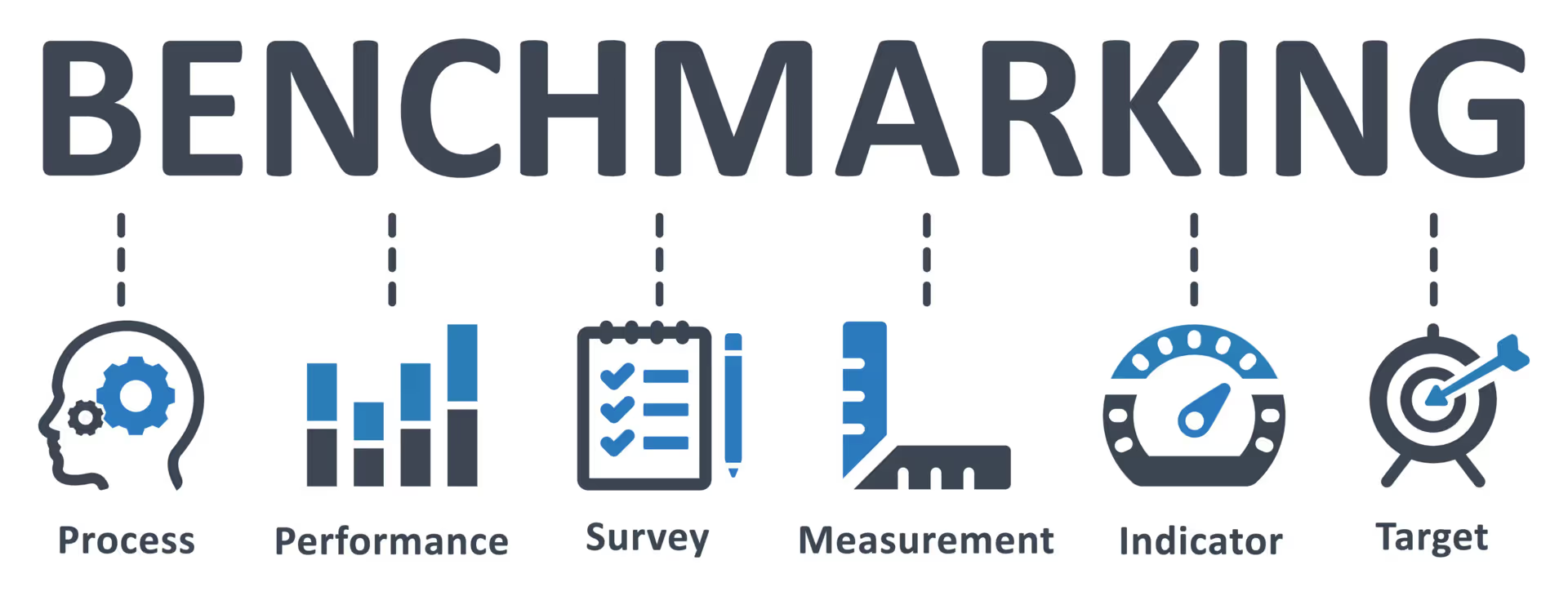How to Conduct Effective Compensation Benchmarking

In today's competitive business landscape, attracting and retaining top talent is crucial for organizational success. One of the key factors that plays a significant role in talent management is compensation. To ensure your organization's compensation packages are competitive and aligned with market standards, conducting effective compensation benchmarking is essential.

Understanding the Purpose of Compensation Benchmarking
- Attract and Retain Top Talent: Compensation benchmarking helps firms determine competitive salary ranges and benefits packages that will attract and retain high-quality employees. By aligning compensation with market standards, firms can position themselves as desirable employers and compete effectively for skilled professionals.
- Ensure Pay Equity and Fairness: Benchmarking enables firms to assess their compensation practices and ensure pay equity within their organization. By comparing their salaries with industry standards, firms can identify and address any disparities or biases in compensation, promoting fairness and equal opportunities for employees.
- Stay Competitive in the Market: The business landscape is constantly evolving, and compensation benchmarking allows firms to stay up to date with market trends. By monitoring industry practices and market rates, firms can adjust their compensation strategies accordingly to remain competitive and attract top talent.
- Enhance Employee Engagement and Retention: Compensation plays a significant role in employee satisfaction and engagement. When employees feel their compensation is fair and competitive, they are more likely to be motivated, productive, and committed to their work. Benchmarking helps firms design effective compensation programs that foster a positive employee experience, leading to improved retention rates.
- Support Strategic Decision-Making: Benchmarking provides valuable insights for strategic decision-making regarding compensation. It helps firms understand how their compensation practices compare to industry peers, identify areas for improvement, and make informed decisions on salary structures, incentive programs, and benefit offerings.
- Mitigate Legal and Compliance Risks: By conducting compensation benchmarking, firms can ensure compliance with labor laws and regulations. Benchmarking helps firms assess whether their compensation practices align with legal requirements, such as minimum wage laws, equal pay regulations, and non-discrimination policies.
- Optimize Compensation Budgets: Benchmarking enables firms to allocate their compensation budgets effectively. By analyzing market data, firms can determine appropriate salary ranges and make informed decisions on salary increases, bonuses, and other compensation components, ensuring optimal utilization of financial resources.
Preparing for Compensation Benchmarking
Preparing for compensation benchmarking requires careful planning and data gathering. Here are some steps to help you prepare effectively:
- Define Job Roles and Positions: Clearly define the job roles and positions within your organization. Create detailed job descriptions that accurately reflect the responsibilities, qualifications, and requirements for each role. This step is crucial to ensure accurate comparisons during benchmarking.
- Identify Relevant Market Segments and Competitors: Determine the relevant market segments and competitors that align with your industry, location, and talent pool. Identify organizations that are similar in size, industry, and geographical location to ensure meaningful benchmarking comparisons.
- Gather Internal Data on Compensation and Benefits: Collect comprehensive and accurate data on your organization's current compensation and benefits practices. This includes salary information, bonuses, incentives, benefits packages, and any other components of total rewards. Ensure that the data is up to date and includes all relevant positions and levels within your organization.
- Establish Benchmarking Criteria and Metrics: Determine the specific criteria and metrics you will use for benchmarking. This may include base salary, total compensation, benefits offerings, or specific components of compensation. Define the benchmarks and standards against which you will compare your organization's data.
- Research and Select Data Sources: Identify reputable compensation data sources, surveys, and industry reports that provide reliable and relevant market data. Consider using multiple sources to validate the accuracy and reliability of the data. Ensure that the data sources cover the job roles and positions you are benchmarking.
- Ensure Data Accuracy and Consistency: Review and validate the internal data you have collected to ensure accuracy and consistency. Standardize job titles, salary structures, and benefit categories to ensure comparability with external data. Double-check the data for any errors or inconsistencies and make necessary corrections.
- Maintain Data Confidentiality and Privacy: Handle the data with utmost confidentiality and privacy. Ensure that access to the data is limited to authorized personnel only. Adhere to privacy regulations and ethical guidelines to protect sensitive employee information.
- Prepare Documentation and Communication: Document the methodology, criteria, and sources used for benchmarking. Prepare clear and concise communication materials that explain the purpose, process, and expected outcomes of the benchmarking initiative. Ensure that employees and stakeholders are informed and aware of the upcoming benchmarking activities.

Interpreting and Applying Benchmarking Results
- Analyzing the gaps between internal and external compensation data: Analyzing the gaps between internal and external compensation data is crucial in understanding where your organization stands in relation to industry standards. By comparing salary ranges, bonus structures, and other compensation components, you can identify any disparities or misalignments. This analysis provides valuable insights into areas where your organization may be overpaying or underpaying employees compared to the market.
- Identifying areas for improvement or adjustment: Once you have identified the gaps between internal and external compensation data, it's essential to pinpoint specific areas for improvement or adjustment. This could include addressing salary discrepancies for certain job roles, reevaluating bonus structures, or assessing the competitiveness of other compensation elements. By identifying these areas, you can develop targeted strategies to enhance your compensation practices.
- Developing strategies to address disparities or align with market trends: To address disparities or align with market trends, organizations need to develop comprehensive strategies. This could involve increasing salaries for positions where the company falls behind the market average, adjusting bonus structures to better incentivize performance, or introducing new benefits to attract and retain top talent. The goal is to create a compensation strategy that is competitive, fair, and aligned with industry benchmarks.
- Considering factors beyond compensation, such as benefits and perks: While compensation is a critical component, it's essential to consider factors beyond monetary rewards. Benefits and perks play a significant role in attracting and retaining employees. Benchmarking can help you understand what additional benefits and perks are common in your industry and how your offerings compare. This information can guide decisions on expanding benefits packages, introducing flexible work arrangements, or enhancing employee wellness programs.
Implementing Changes Based on Benchmarking Findings
- Developing a comprehensive compensation plan: Based on the benchmarking findings, it's necessary to develop a comprehensive compensation plan that incorporates the necessary changes. This plan should outline the revised salary structures, bonus schemes, benefits, and other elements of the compensation package. It should also consider the organization's financial capabilities, market competitiveness, and long-term sustainability.
- Communicating changes and rationale to employees: When implementing changes to compensation, clear communication is crucial. Employees need to understand the rationale behind the adjustments and how they will be affected. Transparent and open communication helps foster trust and reduces any potential resistance or misunderstandings. Clearly explain the benchmarking process, the market factors that necessitated the changes, and how the new compensation plan aligns with the organization's goals and values.
- Addressing potential challenges or resistance: Introducing changes to compensation can sometimes meet with resistance or challenges from employees. It's important to anticipate and address these concerns proactively. Hold open forums, conduct feedback sessions, and provide support and resources to address any employee apprehensions. By involving employees in the process and addressing their concerns, you can help foster acceptance and smooth implementation.
- Monitoring and evaluating the impact of implemented changes: Implementing changes based on benchmarking findings is not the end of the process; it's crucial to monitor and evaluate their impact. Continuously track key metrics such as employee satisfaction, retention rates, and recruitment success to assess the effectiveness of the implemented changes. Regularly review the compensation plan's outcomes and make adjustments as necessary to ensure it remains aligned with the organization's goals and competitive in the market.
Ensuring Ongoing Benchmarking and Review
- Establishing a regular benchmarking schedule: To stay competitive, organizations should establish a regular benchmarking schedule. The market and industry trends change over time, and it's essential to stay up to date with the latest data. By setting a schedule for benchmarking, you can consistently evaluate your compensation practices, identify any emerging gaps or opportunities, and make informed decisions to maintain competitiveness.
- Monitoring market trends and industry shifts: In addition to regular benchmarking, it's important to monitor market trends and industry shifts. Keep a close eye on factors such as economic conditions, changes in labor laws, and emerging compensation practices in your industry. By staying informed, you can proactively adapt your compensation strategies to reflect these trends and remain competitive.
- Making adjustments as needed to remain competitive: Benchmarking is an ongoing process, and adjustments may be necessary to remain competitive. As market conditions or industry standards change, be prepared to make timely adjustments to your compensation practices. This could involve revisiting salary structures, refining benefit offerings, or exploring innovative ways to attract and retain top talent. Being proactive in making adjustments will help ensure that your organization stays ahead in the ever-evolving competitive landscape.
- Continuously reviewing and refining compensation strategies: Finally, it's crucial to continuously review and refine your compensation strategies. Regularly assess the effectiveness of your compensation plan, seek employee feedback, and analyze the outcomes of implemented changes. By continuously refining your compensation strategies based on insights from benchmarking and ongoing review, you can create a dynamic and adaptable compensation framework that supports your organization's overall success.
Frequently Asked Questions
Q1: What is compensation benchmarking?
A1: Compensation benchmarking is a systematic process that involves comparing an organization's compensation practices against relevant market data to evaluate the competitiveness of its pay structure, benefits, and overall rewards package.
Q2: Why is compensation benchmarking important?
A2: Compensation benchmarking is crucial because it allows organizations to make informed decisions regarding their compensation strategies. It ensures that their pay levels remain competitive, helps attract and retain top talent, ensures fair and equitable compensation, and supports effective budget allocation.
Q3: How is compensation benchmarking conducted?
A3: Compensation benchmarking involves collecting and analyzing external market data, such as salary surveys or industry reports, and comparing it to internal compensation data. This comparison helps organizations identify any gaps or disparities and make data-driven decisions to align their compensation practices with the market.
Q4: What are the key considerations for effective compensation benchmarking?
A4: Effective compensation benchmarking requires careful consideration of factors such as job roles and levels, industry or market segments to benchmark against, reliable data sources, data accuracy and consistency, confidentiality and privacy, and clear communication of benchmarking objectives and outcomes.
Q5: How often should compensation benchmarking be performed?
A5: The frequency of compensation benchmarking depends on various factors, including industry dynamics and organizational needs. It is generally recommended to conduct benchmarking at regular intervals, such as annually or biennially, to stay up to date with market trends and maintain competitiveness in attracting and retaining talent. However, organizations may adjust the frequency based on their specific circumstances and the pace of market changes.
Conclusion:
Benchmarking is a powerful tool for organizations to enhance their compensation strategies. By analyzing gaps, identifying areas for improvement, implementing changes, and ensuring ongoing review, businesses can align their compensation practices with market trends, attract top talent, and retain valuable employees. Continuous benchmarking and refinement of compensation strategies are essential for long-term success in a competitive business landscape.
Find out how Compport can help you manage all your Compensation Management and Rewards Tech needs, book a demo today!
%2520(6)%2520(2).avif)


%20(34).avif)
%20(50).png)
%20(49).png)
